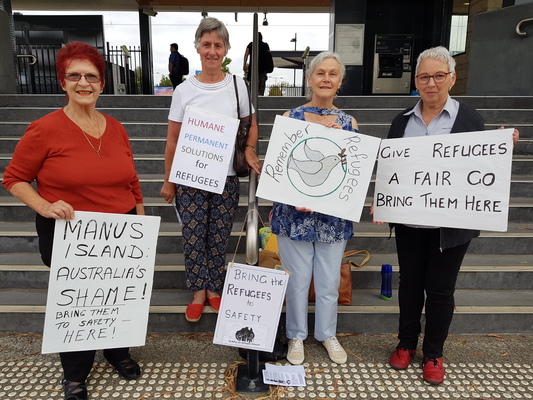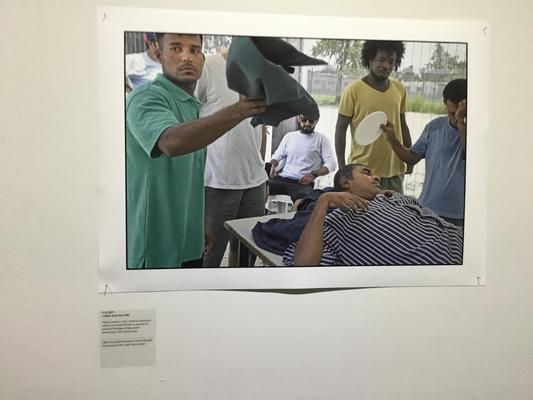
McMillan for Refugees was formed in May 2017 by some constituents of the McMillan Federal electorate.
It is a non-partisan network made up mainly of people resident in the Shire of Cardinia, with others from South and West Gippsland.
Members say they came together to voice their distress at the obvious harm being caused to refugees and asylum seekers detained offshore on Manus Island and Nauru.
“Most of us seek to treat others the way we want to be treated, said Anne Jones, one of the group’s conveners. “We felt that the human rights of refugees and asylum seekers on Manus and Nauru were being denied, and that the government was treating people so inhumanely in our name.”
They consider themselves ordinary decent Australians.
“We are parents, grandparents, sisters and brothers, uncles and aunts,” Ms Jones said.
“We were horrified that this cruelty was happening because of decisions made by the government of our country; decisions in breach of so many Australian and international laws. (The International Covenant on Civil and Political Rights, and the UN Universal Declaration on Human Rights, to name just two.).”
The group became further disheartened when the Federal Government on Monday 4th December 2017, successfully voted down a motion, by one vote only, that had it passed, would have enabled the transfer of some of the refugees on Manus Island and Nauru to be settled in New Zealand, following numerous offers by successive NZ governments.
While some refugees have been transferred to United States, today the remaining refugees and asylum seekers from Manus have been dispersed in various locations in Port Moresby and Manus Island, perhaps to be stranded there indefinitely.
It is legal to seek asylum
Under the international agreements to which Australia is a signatory, it is not illegal for anyone to seek asylum and the group wish to remind people that Australia took a leading role in the 1940’s in the formation of these very human rights conventions.
The United Nations Refugee Convention defines a refugee as: “A person who, owing to a well-founded fear of being persecuted for reasons of race, religion, nationality, membership of a ‘particular social group or political opinion, is outside the country of his nationality…”
An asylum seeker, “…is a person who is seeking international protection…(and)…whose claim for refugee status has not been decided.”
Despite the repeated claim about the illegality of asylum seekers so often heard from politicians, the media and in the community, McMillan for Refugees Network makes representations to politicians of all persuasions advocating for a humane and compassionate response to those legally seeking our protection. They call for refugees on Manus Island and Nauru to be brought to freedom in Australia and elsewhere.
The refugees are a diverse group
Those who are detained on Manus come from Afghanistan, Iran, Iraq, Lebanon, Myanmar, Pakistan, Sri Lanka, Somalia and South Sudan. In these war torn countries, where death and violence is an ever present threat, communities are unable to function, lives are disrupted and there is no choice for people, but to leave in fear of their lives. Most of the people on Manus Island and Nauru have been found to be genuine refugees and yet they have been refused entry to Australia because they came by boat.
McMillan for Refugees members have been inspired by the spirit of those detained.
“The men in the camps speak many languages, practice different faiths, and come from many cultures, yet we see that in their hardship, they have come together to form a unified group that supports and cares for each other,” Ms Jones said.
“Our own communities in Australia could learn much from the example of these men who have endured, their hopes of a secure place to call home have come to nothing, and they have been forced into the most extreme indignities that can be imposed on a human being, without adequate shelter, food and water, or vital medications. And yet they go on.”
Brian Cassey is among many Australians, including Rev Tim Costello, Sr Irene Keogh, Senator Nick McKim, who have been forced to clandestinely visit the camp.
They have heard and reported the stories and have seen for themselves the conditions under which the men on Manus are living. Through social media, we read the messages and hear the voices of the men themselves, many of whom speak English or have learned to speak some English in the time they have been detained.
Members of McMillan for Refugees Network have been a visible presence around Pakenham, Officer and Berwick with short actions on the streets and at train stations.
Many residents have responded positively to the issue.
The group commended Cardinia Council for declaring itself a “Refugee Welcome Zone” and delivered a briefing to Cardinia Council councillors on the current situation on Manus and Nauru calling on Council to advocate to the Federal Government to uphold the human rights of refugees.
The group is planning a public forum “Life on Manus” on 12 April 12, 7-9pm, at Outlook Community Centre Pakenham. Speakers will include well known refugee advocate and visitor to Manus Island, Anne Moon.
Members of the group urgently call on people to shine a light on what the government wants to remain hidden.
For further information about the group, contact Anne Jones on 0432 204 327.







